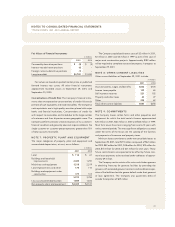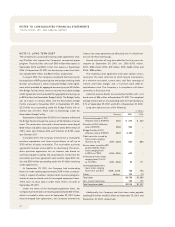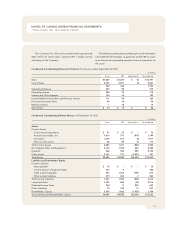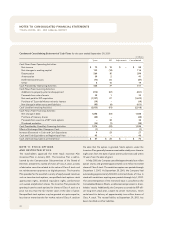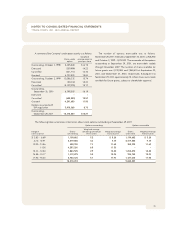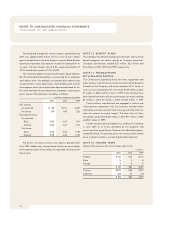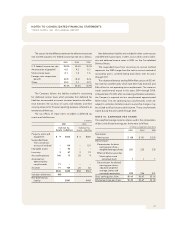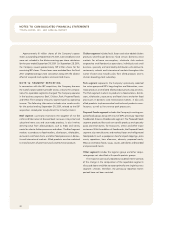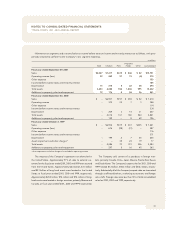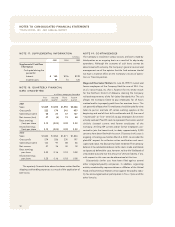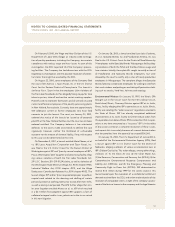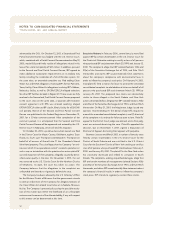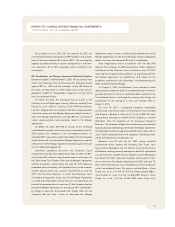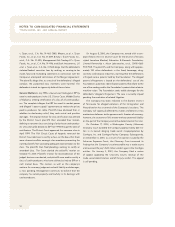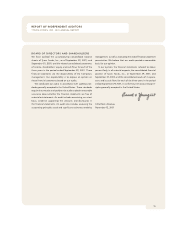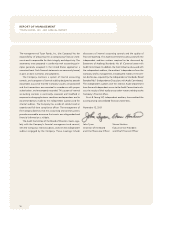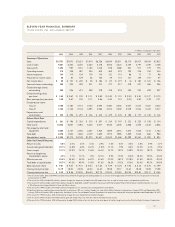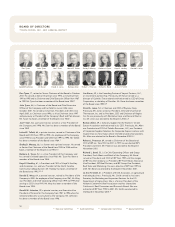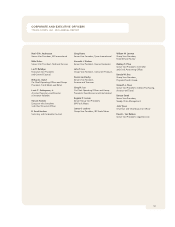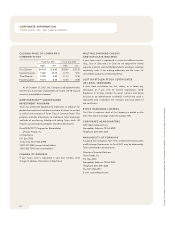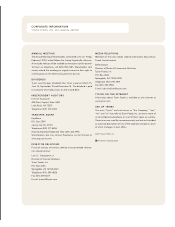Tyson Foods 2001 Annual Report Download - page 53
Download and view the complete annual report
Please find page 53 of the 2001 Tyson Foods annual report below. You can navigate through the pages in the report by either clicking on the pages listed below, or by using the keyword search tool below to find specific information within the annual report.
51
NOTES TO CONSOLIDATED FINANCIAL STATEMENTS
TYSON FOODS, INC. 2001 ANNUAL REPORT
On February 9, 2000, the Wage and Hour Division of the U.S.
Department of Labor (DOL) began an industry-wide investiga-
tion of poultry producers, including the Company, to ascertain
compliance with various wage and hour issues. As part of this
investigation, the DOL inspected 14 of the Company’s process-
ing facilities. The Company has had discussions with the DOL
regarding its investigation and the possible resolution of poten-
tial claims that might be asserted by the DOL.
On August 22, 2000, seven employees of the Company filed
the case of De Asencio v. Tyson Foods, Inc. in the U.S. District
Court for the Eastern District of Pennsylvania. This lawsuit is
similar to Fox v. Tyson in that the employees claim violations of
the Fair Labor Standards Act for allegedly failing to pay for time
taken to put on, take off and sanitize certain working supplies.
Plaintiffs seek to represent themselves and all similarly situated
current and former employees of the poultry processing plants
in New Holland, Pennsylvania. Currently, there are approximately
500 additional current or former employees who have filed
consents to join the lawsuit. The court, on January 30, 2001,
ordered that notice of the lawsuit be issued to all potential
plaintiffs at the New Holland facilities, but the class has not been
ordered certified. The Company believes it has substantial
defenses to the claims made and intends to defend the case
vigorously; however, neither the likelihood of unfavorable
outcome nor the amount of ultimate liability, if any, with respect
to this case can be determined at this time.
On November 5, 2001, a lawsuit entitled Maria Chavez, et al.
vs. IBP, Lasso Acquisition Corporation and Tyson Foods, Inc.
was filed in the U.S. District Court for the Eastern District of
Washington against IBP and Tyson by several employees of IBP’s
Pasco, Washington, beef slaughter and processing facility alleg-
ing various violations of both the Fair Labor Standards Act,
29 U.S.C. Sections 201–219 (FLSA) claims, as well as violations of
the Washington State Minimum Wage Act, RCW chapter 49.46,
Industrial Welfare Act, RCW chapter 49.12, and the Wage
Deductions-Contribution-Rebates Act, RCW chapter 49.52. The
lawsuit alleges IBP and/or Tyson required employees to perform
unpaid work related to the donning and doffing of certain
personal protective clothing, both prior to and after their shifts,
as well as during meal periods. Plaintiffs further allege that simi-
lar prior litigation entitled Alvarez et al. vs. IBP which resulted
in a $3.1 million final judgment against IBP, supports a claim of
collateral estoppel and/or is res judicata as to the issues raised
in this new litigation.
On January 26, 2000, a lawsuit entitled Jose Jairo Gutierrez,
et al. vs. Specialty Brands, Inc. and Foodbrands America, Inc. was
filed in the U.S. District Court for the District of New Mexico by
14 employees at the Specialty Brands’ Albuquerque facility alleg-
ing violations of both the FLSA and the New Mexico wage and
hour statutes. Initially, these plaintiffs sought to certify a class of
all Foodbrands and Specialty Brands employees, but were
allowed by the court to certify only a class of hourly production
employees in Albuquerque. The complaint alleges that Specialty
Brands failed to compensate employees for walking to and from
their work stations and putting on and taking off protective cloth-
ing such as smocks, hard hats, hairnets and earplugs.
Environmental Matters On January 15, 1997, the Illinois EPA
brought suit in the Circuit Court for the 14th Judicial Circuit,
Rock Island, Illinois, Chancery Division against IBP at its Joslin,
Illinois, facility alleging that IBP’s operations at its Joslin, Illinois,
facility are violating the “odor nuisance” regulations enacted in
the State of Illinois. IBP has already completed additional
improvements at its Joslin facility to further reduce odors from
this operation, but denies Illinois EPA’s contention that its oper-
ations at any time amounted to a “nuisance.” IBP is in the midst
of discussions aimed at a complete resolution of these issues,
and reports this issue solely because of a recent determination
that the penalties have the potential to exceed $100,000.
On January 12, 2000, The U.S. Department of Justice (DOJ),
on behalf of the Environmental Protection Agency (EPA), filed
a lawsuit against IBP in U.S. District Court for the District of
Nebraska, alleging violations of various environmental laws at
IBP’s Dakota City facility. This action alleges, among other things,
violations of: (1) the Clean Air Act; (2) the Clean Water Act;
(3) the Resource, Conservation and Recovery Act (RCRA); (4) the
Comprehensive Environmental Response Compensation and
Liability Act (CERCLA); and (5) the Emergency Planning and
Community Right to Know Act (EPCRA). IBP determined to
reserve $3.5 million during 1999 for the claims raised in this
lawsuit based upon the evaluation of a confidential settlement
demand received from the DOJ, and review and evaluation of the
resolution of comparable claims, in light of the company’s assess-
ment of the facts as known to the company and the legal theories


